2024.05.25
【PHAJ】PHAM2024 Report

2024 Planetary Health Summit and 6th Annual Meeting – From Evidence to Action: Confronting Reality: Report
Conference Date/Place: April 16-19, 2024 / Sunway University, Malaysia
Conference Website: https://www.pham2024.com/
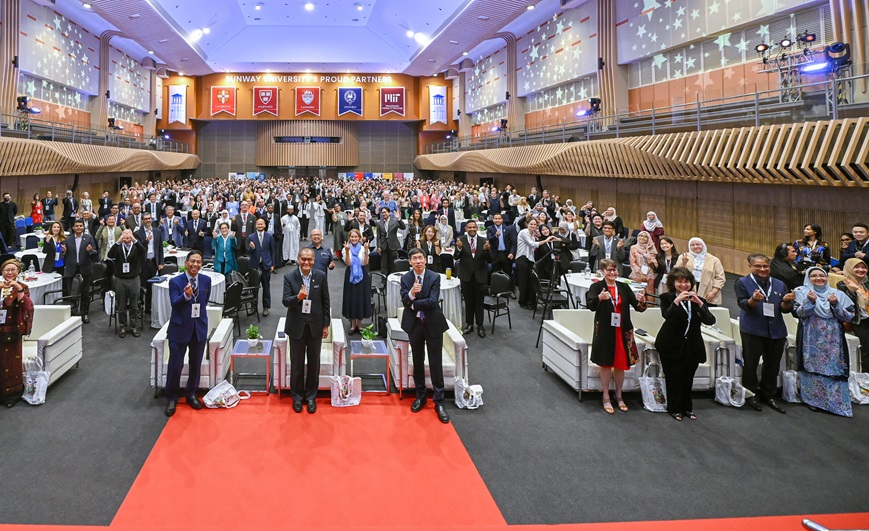
The 2024 Planetary Health Summit/6th Planetary Health Alliance Annual Meeting (PHAM 2024) was held at Sunway University in Malaysia. This was the first time to be held the meeting in Asia. Over 1,000 participants from 63 countries gathered for four days of discussions on how we can collaborate, confront, and take action on global challenges. More than 100 presenters shared their issues, case studies of their activities, what is needed to take action, and their visions for the future in various sessions, and more than 120 poster presentations were made.
During four days of the conference, there were three sessions proposed by Planetary Health Alliance Japan Hub members, as well as heated discussion sessions on many areas (such as the use of AI, new forms of financial systems, mental health topics, etc.). Then, the conference’s final day was dedicated to discussing how we need to take action on global planetary health issues. The following is a report on the content of the discussions.
Plenary Session: Breaking Down Silos – Systemic Change for Planetary Health (April 17)
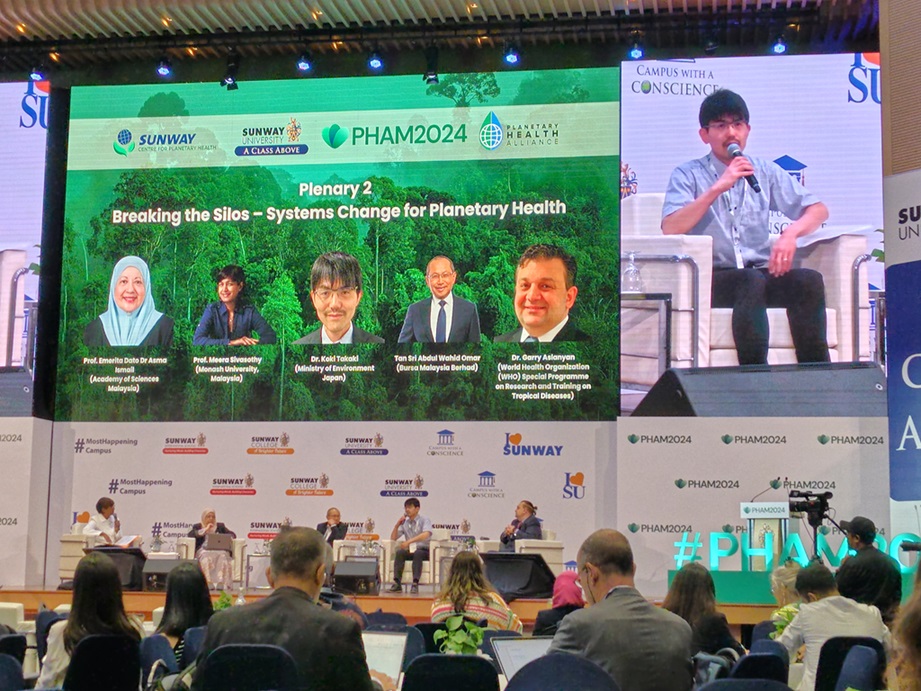
In this session, as the lead speaker, Dr. Koki TAKAKI from the Environmental Health Department of Japan’s Ministry of the Environment gave a presentation on “Japan’s Environmental Administration and Planetary Health”. Dr Takaki introduced the “Sustainable Development Goals (SDGs) implementation Guiding Principles Revised Edition (2023)” and “Sixth Basic Environment Plan (scheduled for 2024),” which include descriptions of “planetary health” in the Japanese government’s major plans. Also, he introduced the revision of the “Climate Change Adaptation Law (2023)” which is the cross-ministry to improve heat stroke countermeasures. From Malaysia, Prof. Asma Ismail, Professor Emeritus of the Malaysian Academy of Sciences, introduced the “National Planetary Health Action Plan” to be completed in July 2024, with a strong message about the importance of breaking down silos. Tan Sri Abdul Wahid Omar, Chairman of Bursa Berhad Malaysia, spoke from the business side about the importance of comprehending and sequencing the various frameworks for sustainable development and the importance of cooperation between countries and companies beyond silos. Dr. Garry Aslanyan, WHO Special Programme on Research and Training on Tropical Diseases, spoke about the difficulty of generalizing the terminology but the importance of never giving up. The panellists also emphasized the importance of human resource development (education) to take action in Planetary Health.
Through these discussions, we realized that when we think about the current state of the earth, we don’t have time to get caught up in the various phenomena that are unfolding in each area and we need to move now. This silo exists not only in specialized areas but also among layers of government, business, and education, and the session taught us that we should reconsider our original purpose and reconstruct these strong fixed concepts.
Session: Indigenous & Local Perspectives (April 17th)
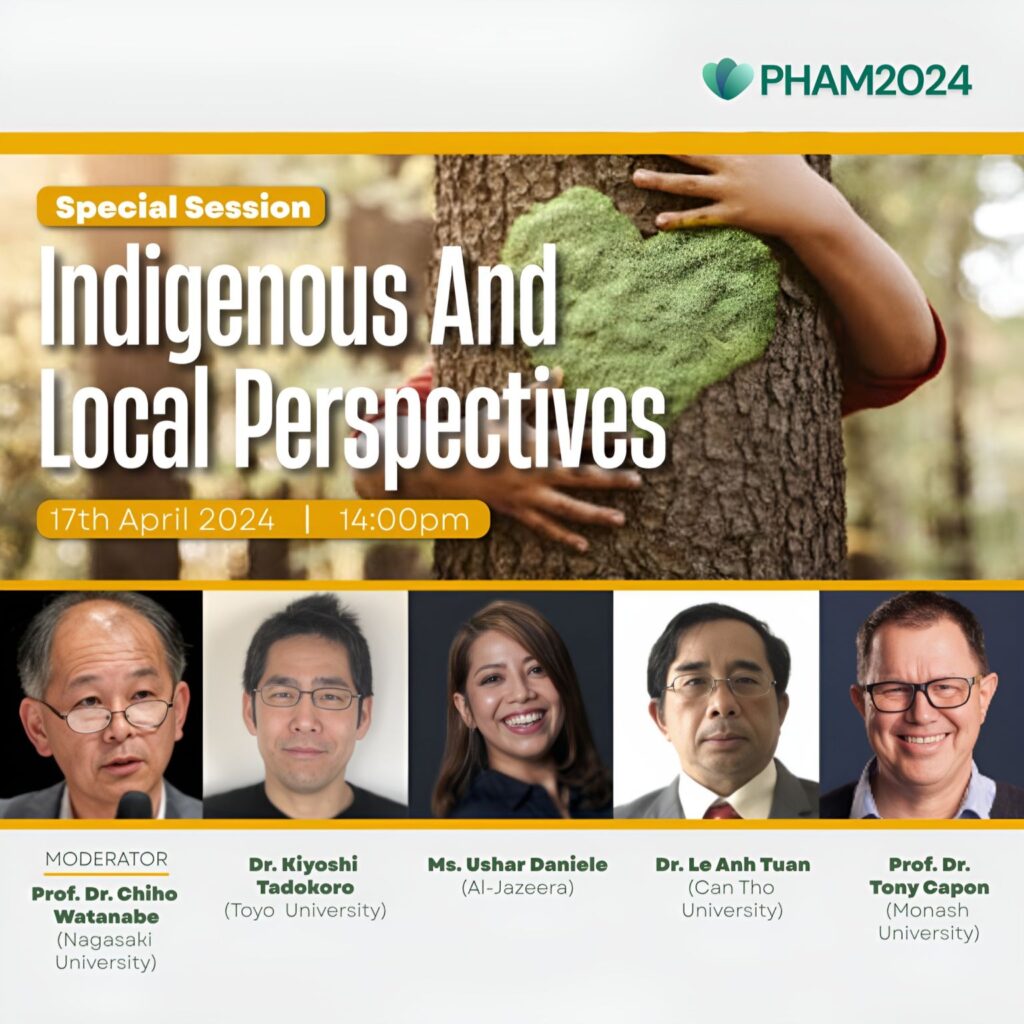
The concept of planetary health as currently discussed has been inspired by the Lancet paper, presumably reflecting Western view, so to speak. Since the bottom line of planetary health is to reconsider the relationship between human society and the earth (environment and ecosystem), there may be differences between the “planetary health view” of West and the East. Recent discussion on the worldview of so-called indigenous peoples evolved along this line. In this session, four speakers discussed the human-nature relationship in Asia and Oceania. Prof. Tuan of Can Tho Univ. reported on the importance of water and rivers to the people in the Mekong Delta in Vietnam, and how climate change is already beginning to affect them. Ms. Daniele, an international journalist based in Malaysia, is from an ethnic minority group who pointed out that both peninsular and island regions of Malaysia have customs that self-regulate the use of environmental resources, and that these customs tend to be lost due to the lack of documents describing them. Prof. Tadokoro, Toyo Univ, introduced his observation that eel fishing in Papua New Guinea is successful when the target eels are addressed as a personable object. Prof. Capon of Monash University introduced an example of how the concept of planetary health is being used in an ongoing urban redevelopment project in eastern Australia, incorporating the indigenous view of nature. Exchange of opinions among the speakers and floor participants followed, reiterating their attention to the existence of people who carefully watch over nature and the importance of sharing such information widely.
Session: Healthy Cities Initiative (April 18th)
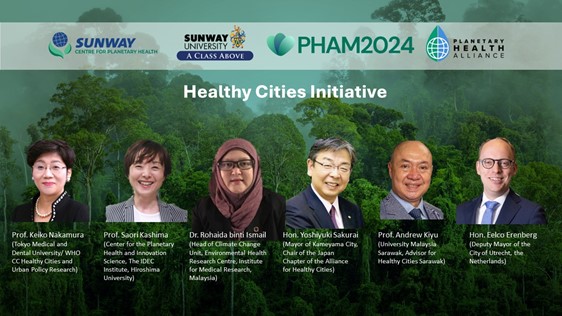
In this session, we learned from healthy cities policies and practices and discussed contributions of locally based initiatives to planetary health. First, Prof. Keiko Nakamura of Tokyo Medical and Dental University introduced Healthy Cities, which has been developed to create urban environments supportive of the health of residents. Hon. Eelco Erenberg, Deputy Mayor of Utrecht in the Netherlands, introduced the transformation of a car-centered city that had problems with air and noise pollution into “The 10-minute city.” There were many questions about a significant transition from a motorized society to bicycle transportation. Participants learned the importance of vision sharing and the commitment to promote a solid plan. Hon. Yoshiyuki Sakurai, Mayor of Kameyama City, Mie Prefecture, and Chair of the Japan Chapter of the Alliance of Healthy Cities, reported on an exchange program by Healthy City Mayors of Japan and Europe, supported by WHO European and the Western Pacific regions, to visit examples in blue and green zones. Measures aimed at preserving biodiversity that respects Kameyama City’s rich natural environment were also introduced. Prof. Saori Kashima of Hiroshima University introduced examples from a highly aged society with the increased number of disasters. They are from Owariasahi City, Aichi Prefecture; Taito City, Tokyo; and Higashihiroshima City, Hiroshima Prefecture. She talked about the importance of collaboration among partners, including governments, the private sector, local communities, agricultural producers, health centers, and universities, as well as the development of the Planetary Healthy Aging Index. Dr. Rohaida binti Ismail from the Institute of Environmental Health, Ministry of Health Malaysia spoke about the eco-health approach. She introduced the promotion of resilient health services based on evidence on climate change, environmental conditions, and health outcomes. Prof. Andrew Kiyu, University of Sarawak, Malaysia, summarized the session. Policies and activities of Healthy Cities contribute to planetary health. Collaboration among partners, emphasis on ecosystem health, and the significance of community activities were confirmed. Further efforts from the local settings are anticipated.
“Kuala Lumpur Action Plan” and “Planetary Health Roadmap and Action Plan” (April 19)
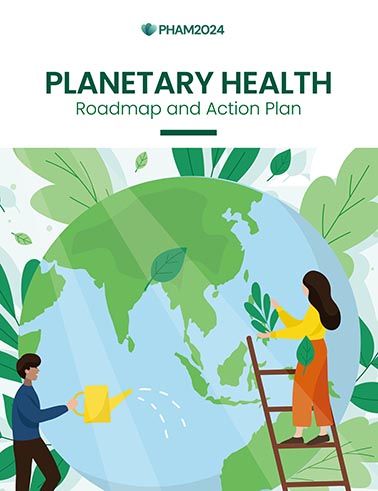
On the last day of the conference, the “Planetary Health Roadmap and Action Plan” was compiled as a proposal and a declaration was issued on the implementation of this action plan as the “Kuala Lumpur Action Plan. This action plan was discussed by over 100 people from around the world over a year. Based on the research and scientific evidence to date, the action plan outlines specific actions that we need to take globally to address the current global crisis, protect ecosystems and human health, and build a safe, equitable, and prosperous future for all people. It includes action plans for three key change areas: global governance, education, and business, and outlines communication and advocacy for these actions. The action plan will be implemented immediately, and its implementation will be monitored around the world, with a report on progress to be presented at the next annual meeting in the Netherlands (scheduled for fall 2025). Currently, we are calling for collaborators on six key actions 1) measuring, 2) communicating, 3) educating, 4) building governance, 5) balancing business and Planetary Health, and 6) mainstreaming planetary health along this action plan. More information can be found at the following website, and we look forward to your participation
Kuala Lumpur Call to Action on Planetary Health
https://www.planetaryhealthalliance.org/kuala-lumpur-call-to-action
Planetary Health Roadmap and Action Plan
https://www.planetaryhealthalliance.org/roadmap
Conclusions
Compared to the previous conference in 2022 (held at Harvard University in Boston), PHAM 2024 was more attended by people from various backgrounds, including financiers, bankers, pharmaceuticals, IT, and medical/health professionals. We heard that this was more on-site participation than the conference office had expected. In addition, many undergraduate and graduate students attended the conference and actively asked questions at each session. Through this PHAM 2024, we could sense increasing interest among young researchers and great social movements in Planetary Health. In this movement, we need to work together to take actual action to tackle the various global issues we face. Then, PHAM2024 came to a close with a pledge to implement such actions and report the progress at the next conference in 2025. The Planetary Health Alliance Japan Hub members look forward to your participation in putting this action plan into practice together.

